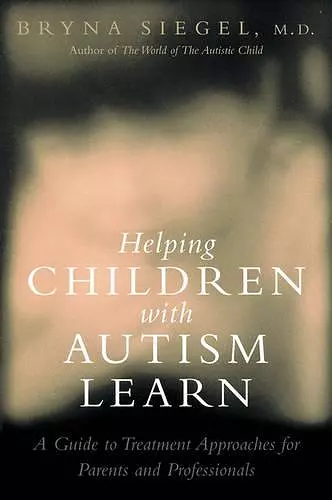Helping Children with Autism Learn
Treatment Approaches for Parents and Professionals
Format:Paperback
Publisher:Oxford University Press Inc
Published:5th Apr '07
Currently unavailable, and unfortunately no date known when it will be back

Children with autistic spectrum disorders have unique learning styles, or "autistic learning disabilities". These pose unique challenges to parents seeking the best educational path for their autistic child, and for educators shaping educational programs for children with autism and related disorders. In Helping Children with Autism Learn, Dr Siegel, a developmental psychologist and director of a large university clinic for autistic children, provides concrete guidance for dealing with these challenges. The book not only enumerates the "autistic learning disabilities", but critiques all of the available educational programs for these children, pointing out the strengths and weaknesses of each program and the appropriateness of a program for specific "disabilities". Helping Children with Autism Learn is structured so that the parent and teacher can use it as a program planner and can evaluate the success and appropriateness of each strategy, refining the program as necessary. Key areas of concentration are language, academic skills, social skills, as well as adapting the child to independence and day-to-day needs. Throughout, Siegel emphasises the need to tailor programs to fit each child's unique needs, and to adapt programs as the child matures and ages. Dr Siegel pulls together a wealth of long-needed information. She provides a superb guide and resource for parents, teachers, clinicians, and other educators who work with autistic children.
"Besides writing in an accessible and often lighthearted style, Siegel has established an excellent and clearly defined structure for each chapter, providing a concise overview, thorough descriptions, and conclusions that help bridge the gap between readers with different backgrounds and familiarity with ASD."--Library Journal (starred review)
"Excels at showing what parents and educators need to do to reach autistic children. She includes a valuable section on having successful individualized educational programs (IEPs), the standard for children with special needs."--Library Journal (Collection Development for Autism)
"This book contains an abundance of clearly written, easy to understand information for educating the child with autism."--Temple Gradin, author of Thinking in Pictures
"This is a very positive book--sensitive to the dilemmas that children with autism face and positive about their ability to learn and adapt. It focuses on solutions to the challenges that autism presents, solutions that lead to new learning and adapting. Siegel's conversational style of language makes the book highly accessible for parents, teachers, and the various interventionists who serve children with autism. Her description of the matrix of abilities and disabilities--how the core neuropsychological features of autism come together to create patterns of strengths and weaknesses--demystifies some of the puzzle of autism. She draws the outline of the separate pieces and shows how they fit together to form both the familiar pattern of autism that clinicians recognize but also the individual profile that defines each individual person with autism."--Sally Rogers, Professor of Psychiatry and Behavioral Sciences, The M.I.N.D. Institute, University of California Davis Medical Center
"Bryna Siegel has made a thoughtful and learned analysis of the unique and perplexing learning strengths and weaknesses exemplified by the autism spectrum. Her book makes a valuable contribution to parents and professionals searching for clarification."--Eric Schopler, Founder and Co-Director, Division TEACCH, University of North Carolina at Chapel Hill
"The landscape of educational and treatment options for children with autism spectrum disorders is complex and often overwhelming for parents and professionals. Drawing from her many years of experience, Dr. Siegel provides a helpful guide for making decisions about directions in educational programming."--Barry M. Prizant, Ph.D., CCC-SLP, Director, Childhood Communication Services and Adjunct Professor, Center for the Study of Human Development, Brown University
ISBN: 9780195325065
Dimensions: 235mm x 156mm x 33mm
Weight: 694g
512 pages